
For those in peril on the sea
A favourite pastime for media types is to compile lists of the best films about journalism. Always near the top are those that make us feel good about ourselves and our role in society: Spotlight, All the President’s Men, The Post. But there is another side to our world: cynical, power-hungry and corrupt. The sort of world depicted in Citizen Kane, which was for years regularly acclaimed not only as the best about journalism, but the best film of all time. Not so much these days.

Another on this side of the divide is Ace In the Hole, directed by Billy Wilder and starring Kirk Douglas, which was made just over 70 years ago. I watched it on a black and white TV in my early teens, and have seen it just the once, but it has stuck with me ever since. I can remember parts of the dialogue as though it had been rescreened only yesterday, most particularly Douglas’s explanation of the meaning of the title.
An ace in the hole comes from poker; it means to keep your best card up your sleeve (not literally, of course) to be produced at the most opportune moment. But in the film, it also meant the enhanced value of having just the one man stuck underground – generating more public interest than there would have been had there been more. Douglas the journalist spins out the rescue effort to maximise the benefits to his career, a circus builds at the scene and more and more people see how they can profit from the man's predicament – all the time convincing themselves that he’ll be all right in the end. Spoiler alert: he isn’t.
Back here in the real world, I still find myself thinking about that phrase “ace in the hole” every time there is a “race against time” to rescue someone – or more usually a group of people. Not in the sense of prolonging their jeopardy, but in the other definition from the Wilder film: that people are always more interested in an individual’s trauma than in the suffering of greater numbers of less identifiable victims. There could hardly have been a more stark illustration of that than in the past week.
Possibly the worst migrant boat disaster ever
Last Wednesday, a fishing trawler carrying up to 750 people sank in the Mediterranean. Just over 100 were rescued and some 80 bodies were found. We don’t know how many were actually on board, but almost every account puts it at many hundreds. The survivors and the victims recovered from the water were men; hundreds of women and children were reportedly travelling below deck and will almost certainly have drowned. This story would develop over the following days, with allegations that Greek coastguards had been towing the vessel – not to shore, but out to sea – causing it to flip. Harrowing detail came from medics treating the survivors and from those who had been on board themselves.
This was a quite horrendous loss of life – one EU official speculated that it might prove to be the worst migrant boat disaster ever – yet, even with the question of possible official culpability, it struggled to capture the attention of our newspapers. Glenda Jackson had died, Boris Johnson was pretending to go out jogging, the Ashes were about to start. Only the Guardian had it on the front. As if proving the “Ace in the hole” point, the Times put the story across the foot of its opening foreign spread: “600 lost” under a big tint panel with a picture of a fairytale schloss set against the Bavarian mountains to illustrate the story of “Woman pushed to her death at castle”.
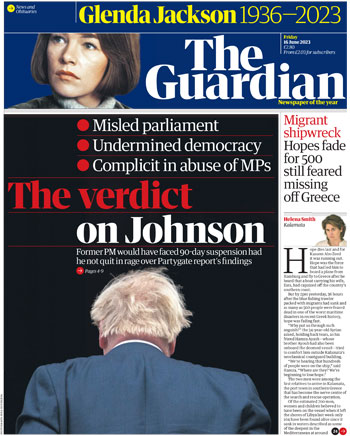
As with the “miracle children” last week, you have to wonder what it takes for a sub writing "600 lost" in a headline to put up their hand and ask the boss: “Excuse me, isn’t this worth a little more?”
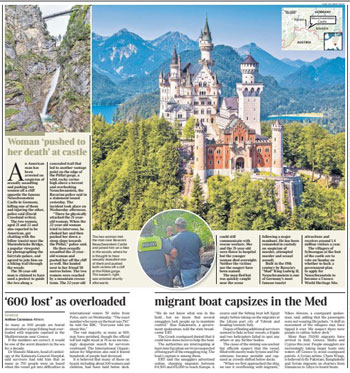
The “caring” Daily Mirror had the story on page 31 (focused on a “Brit’s fears for family”), way behind acres of Johnson and Partygate, the death of footballer Gordon McQueen, a spread on Glenda, and another on Jack Grealish’s son. The Daily Express didn’t report it at all – other than in James Whale’s column a few days later, where it was cited as evidence of why Europe had “to solve the migrant crisis”.
I hadn’t expected a surfeit of compassion, but did think that – at the very least – the papers so keen to share Suella’s every thought with their readers might use the tragedy to demonstrate the need to “stop the boats”.
The Daily Mail reported “79 dead” at the top of a page where the lead was “One in three saved by RNLI’s lifeboats last year were immigrants”. The RNLI said the figures proved the value of its work in the Channel, but “critics” claimed this proved the charity was being used as a “migrant taxi service” to Dover. It was hard to escape a sense of disapproval, whether at the strains being put on the lifeboats by these invaders, or that their rescue efforts were somehow inappropriate or misplaced.
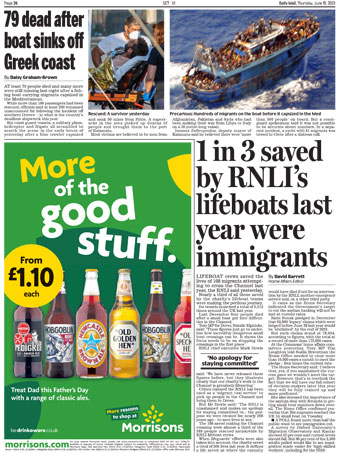
The search for Titan
No such disapproval, of course, for the extreme rescue efforts this week to locate the submersible taking adventurers on an ultra-deep-sea tour of the Titanic. The BBC reports this morning that at least five ships plus aircraft and remotely-operated vehicles are searching 10,000 square miles of ocean.
There is no doubt that this has been the most compelling story of the week (as evidenced by today’s live blogs from the BBC and others). Five identifiable people trapped with a limited supply of air in a tiny capsule way beyond reach of most diving vessels – even if they knew where it was.
The fact that they were there to look at the most famous shipwreck of the 20th century was a vital egg in the pudding; that one of the five was a “British billionaire” a bit of extra flavouring (though I’m sure that Hamish Harding would prefer the “explorer” or “adventurer” tag to the reference to his wealth – were we supposed to be more or less concerned for him because he had so much money?).
I would not for a minute question any of the front pages devoted to this story over the past couple of days (well, perhaps the Star’s “video game submarine” was a bit crass – albeit an excellent nugget). If I were choosing a front of the week, it might even be Tuesday’s Mail. Apart from the billionaire thing, it went wholeheartedly for the story from the off, while others were still busy moaning about the Tories or telling us that Kate had a spotty dress at Royal Ascot.
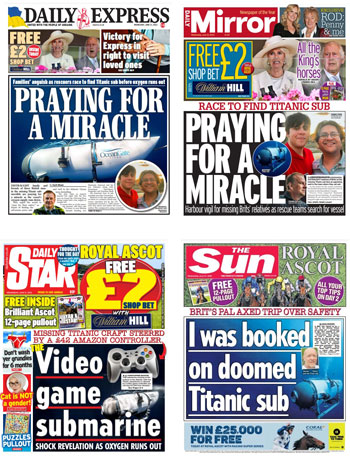
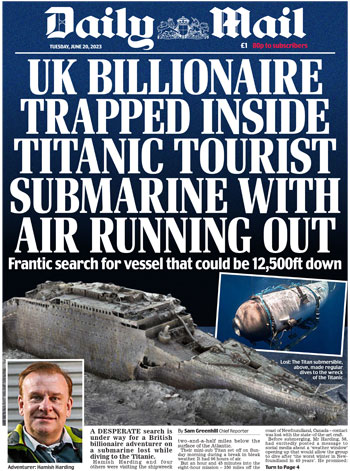
Aside from the “ace in the hole” principle, there is a further factor that determines the coverage: hope. We can invest in and root for the five, pray for a happy ending. And, whatever the outcome, we will still be (a bit) interested for a few more days – whether in celebration or recrimination. By the time we had even heard of the five hundred still missing at sea, all hope was lost and we can scarcely be bothered to worry about official culpability.
Both of these groups of people put to sea knowing the risks. One set were people with everything, setting off for fun. The other were people with nothing, setting off out of desperation. As I write, the trapped adventurers should have a few hours’ oxygen left and there are reports of “sounds” near the wreck. Like everyone else, I hope they make it. But I really wish that out of the ton of concern shown for the Titanic tourists, our media could have reserved just an ounce or two of compassion for the victims of that boat off Greece.

Liz Gerard’s Notebook is a fortnightly column published in the InPubWeekly newsletter. To be added to the mailing list, enter your email address here.












